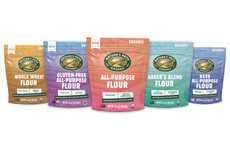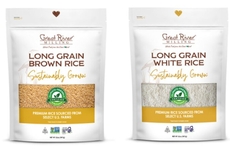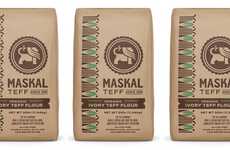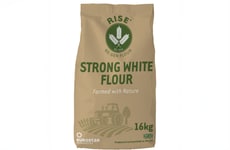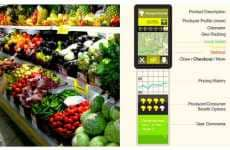
Stone-Buhr's 'Find the Farmer' Provides Product Traceablity
Katie Cordrey — May 24, 2009 — Eco
References: findthefarmer & nytimes
Stone Buhr’s ‘FindTheFarmer.com’ website allows consumers to enter a product lot code to find the farmers who produced the grain used in making the company’s locally-grown all-purpose flour.
Bios and information about each farmer are listed in the ‘Meet the Farmers’ section. There is also an ‘Ask the Farmer’ feature that allows questions to be submitted for farmer response.
In 2007 the 100-year-old Stone Buhr Company realized that its participation in the local food movement could be a force for positive change. It replaced its commodity flour with flour from Columbia Plateau Producers, a Food Alliance-certified group of family farmers located in Oregon, Washington and Idaho.
Stone Buhr began offering source tracking of flour lots beginning in March of 2009. The concept is betting that the transparency it fosters will create marketplace confidence because of increased consumer knowledge and heightened producer visibility.
Bios and information about each farmer are listed in the ‘Meet the Farmers’ section. There is also an ‘Ask the Farmer’ feature that allows questions to be submitted for farmer response.
In 2007 the 100-year-old Stone Buhr Company realized that its participation in the local food movement could be a force for positive change. It replaced its commodity flour with flour from Columbia Plateau Producers, a Food Alliance-certified group of family farmers located in Oregon, Washington and Idaho.
Stone Buhr began offering source tracking of flour lots beginning in March of 2009. The concept is betting that the transparency it fosters will create marketplace confidence because of increased consumer knowledge and heightened producer visibility.
Trend Themes
1. Product Traceability - Companies in the food industry should consider implementing traceability tools to increase transparency and build trust with consumers.
2. Localized Food Sourcing - Businesses in the food industry can benefit from sourcing products locally, as consumers become increasingly interested in supporting sustainable and environmentally-friendly practices.
3. Farmer Engagement - Food companies can engage with farmers, provide them with a platform to share their stories, and foster trust between producers and consumers, leading to increased sales and brand loyalty.
Industry Implications
1. Food Production - Companies in the food production industry can take advantage of the trend towards product traceability to create innovative new products and increase transparency in their supply chains.
2. Agriculture - Farmers who are interested in sustainable and environmentally responsible practices can use traceability tools to increase transparency and consumer confidence in their products.
3. Technology - Technology companies can develop new, innovative solutions to facilitate product traceability and help connect consumers with producers, increasing transparency and trust in the food industry.
1.8
Score
Popularity
Activity
Freshness


